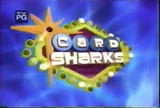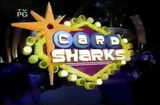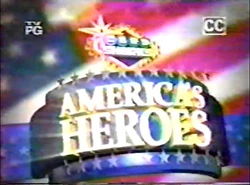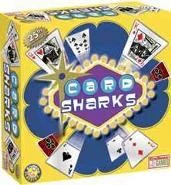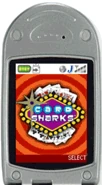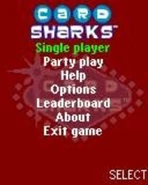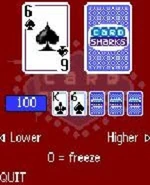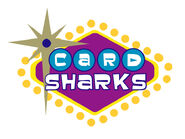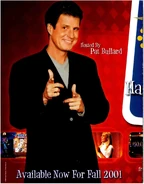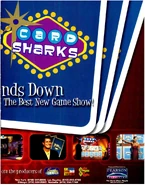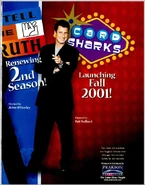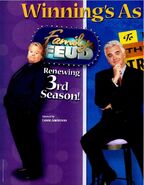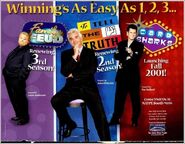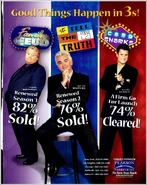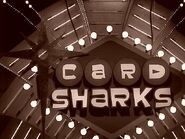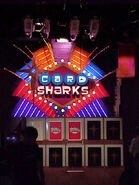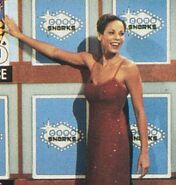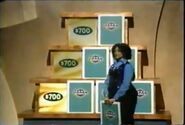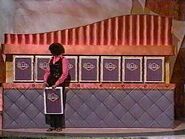| Aired | |
| Pilot, 2000 Syndicated, September 17, 2001 – January 11, 2002 | |
| Run time | |
| 30 Minutes | |
| Host | |
| Pat Bullard | |
| Dealer | |
| Daphne Lynn Duplaix (pilot), Tami Anderson (series) | |
| Announcer | |
| Gary Kroeger | |
| Origination | |
| Tribune Studios, Hollywood, California | |
This is chronicling the ill-fated 2001 revival Card Sharks.
Game format
Main game
The gameplay was drastically different from the successful incarnations of the 1970s and 1980s. Four players competed, two at a time, in a best-of-three match. Each round used a single row of seven cards.
Perhaps the most jarring difference was the lack of survey, educated guess, and "10 audience members" questions used on the previous versions; instead, one player started the game in control of the cards and kept control as long as they kept guessing correctly. An incorrect guess passed control over to the other player unless it was on the last card of the row, when it meant an automatic loss for the player who guessed it wrong.
All four players were given two "Clip Chip" tokens to start the game, and if one of them wanted to change the card in play they would place the token in a slot on their podium. A video clip would play, with one of three possible options:
- A situation (a la Candid Camera or Street Smarts) which was stopped before its resolution.
- Someone introduces himself/herself and then asks which of two others he/she is associated with.
- Someone trying to list answers related to a topic within 10 seconds, or sing the correct lyrics to an obscure song.
Correctly predicting the outcome of the clip allowed the contestant to change the card, while an incorrect answer did not.
Each game was worth $500. As before, two games were needed to win the match. The winner received a total of $1,000. The loser received an Argus digital camera as a consolation prize in addition to the $500 if they won a game.
The third game, if necessary, was played similar to the tiebreaker on the original Card Sharks with three cards. The difference, other than the fact that there was only one row of cards used, was that no Clip Chips could be used.
The two match winners then squared off in the Big Deal, one final row of seven cards. Clip Chips, if the players had any left, were still in play. Whoever won this final showdown won an additional $1,100 and advanced to the Money Cards. The loser of the Big Deal won a consolation trip to Las Vegas in addition to their previous $1,000.
Money Cards
This version's Money Cards differed from the original three versions.
The Money Cards board was pyramid-shaped. Three rows of cards (three cards on the bottom row, two cards in the middle and one card on the top) were dealt, with the last card on the top row called the "Major Wager" (an updated version of the "Big Bet" seen in earlier versions).
The day's champion's $2,100 were equally divided among each of the three rows ($700 per row).
Just as in the original NBC version, the winning contestant can change the base card on each row.
The contestant began with $700 on the bottom row. The top card from the deck was placed at the start of the row and shown to the contestant, who then made a wager based on whether he/she thought the next card was higher or lower, with a minimum wager of $100. Wagering continued until the contestant played the three cards on the bottom row or busted.
The last card on the bottom row was moved to the left of the middle row and the contestant received an additional $700. The contestant then played the next two cards as he/she did on the first row, wagering as he/she went along.
The last card in the middle row was placed next to the card on the top row for the final bet, the "Major Wager", and the contestant received an additional $700. The minimum bet on this card was at least half of the contestant's current total. The maximum total possible was $51,800.
Contestants could only change the base card on each row. A tie (push) originally returned the amount wagered to the contestant (as had been the case since late 1980), but it was later changed to a loss (from 1978-late 1980). If a contestant busted on the final card, he/she received $700 as a consolation prize. The most money ever won on this version was $27,450.
Unlike the earlier versions, the games were self-contained, starting with the semifinals and ending with the Money Cards. In addition, there were no returning champions and no car games.
Sequence of The Top Prize
| $25,900 | $51,800 | ||
| $6,300 | $12,600 | $25,200 | |
| $700 | $1,400 | $2,800 | $5,600 |
Trivia
It's set and props from this version were later used for the short-lived GSN reboot of the cult-classic 1980s game show Press Your Luck called Whammy!: The All-New Press Your Luck (shorten to Whammy! later on) hosted by Todd Newton and announced by Gary Kroeger from 2002 until 2003.
The "WOOSH!" Sound effect from this show was carried over to the current syndicated version of Family Feud since then.
Despite it's super short run, this version of Card Sharks did two special shows featuring men & women of the Armed Forces called America's Heroes, to celebrate the police and firefighters of 9/11.
Merchandise
Board Game
Despite it's one year cancellation in 2002, Endless Games released a home game adaptation to celebrate it's 25th anniversary in 2002, even though the logo from 2001 is used on the box, the gameplay was based on the 70s and 80s formats with the Perry-era front-end game (awarding $500 for the winner) and the Eubanks/Rafferty-era "Money Cards" format.
Mobile Game
A version for mobile phones was released by Telescope inc. on June 1, 2005, the Logo was still based on the 2001-2002 version while the theme music was a mini-remix of the original 1978-1981 version. the game play was based on the 70s/80s version. more poll questions were also available for download.
Link
Online Game
An online version of Card Sharks was once available at Uproar.com. While its logo was still based on the ill-fated 2001-02 revival. The gameplay was based on the 70s and 80s version minus the poll questions.
Photos
Logos
Press Promo
2000 (Pilot) Set Pics
2000 (Pilot)
2nd Pilot Set
2001-2002 Set Pic
2001-2002 Series
Video

WWOR Card Sharks promo, 2001

Card Sharks (2001)-1

Card Sharks (2001)

Card Sharks (2001)-0

Card Sharks (Bullard) America's Heroes

Card Sharks 2001 - Part 1

Card Sharks 2001 - Part 2

Card Sharks 2001 - Part 3

Card Sharks 2001 - Part 4

Card Sharks (Bullard) Raymond Cori Josh Leslie

Card Sharks (Bullard) Stephan Andrea Regina Bo
See Also
Card Sharks (1978)
Card Sharks (1986)
Card Sharks (1996 pilot)
Links
A Review of the Card Sharks 2000 Pilot (via Internet Archive)
Card Sharks (Bullard) @ Jay Anton
"ACE IS HIGH, DEUCE IS LOW, PLAY THE CARDS, WIN THE DOUGH" Endless Games Adds Card Sharks to Its Line of Retro Games
CARD SHARKS: The Board Game!! @ Game Show Galaxy (via Internet Archive)
Game Show Board Games: Card Sharks
Card Sharks (instructions) @ Endless Games
